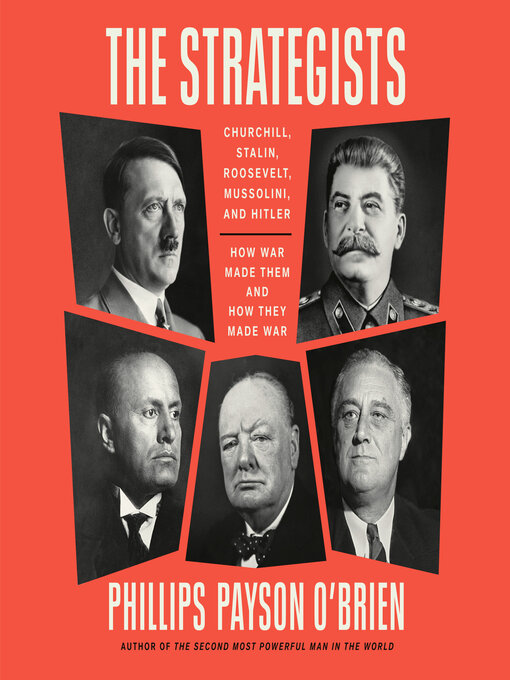- No wait, no problems
- What's new?
- Popular titles
- Check these out!
- Walk A While in Their Shoes
- See all ebooks collections
The Strategists
Churchill, Stalin, Roosevelt, Mussolini, and Hitler—How War Made Them and How They Made War
In The Strategists, Professor Phillips Payson O'Brien shows how the views these five leaders forged in WW1 are crucial to understanding how they fought WW2. For example, Churchill's experiences of facing the German Army in France in 1916 made him unwilling to send masses of British soldiers back there in the 1940s, while Hitler's mistakes on the Eastern Front were influenced by his reluctance to accept that conditions had changed since his own time fighting. The implications of the power of leaders remain with us to this day: to truly understand what is happening in Ukraine, for example, requires us to know what has influenced the leaders involved.
This is a history in which leaders—and their choices—matter. For better or worse.
-
Creators
-
Publisher
-
Release date
August 27, 2024 -
Formats
-
OverDrive Listen audiobook
- ISBN: 9780593951699
- File size: 522982 KB
- Duration: 18:09:32
-
-
Languages
- English
-
Reviews
-
Publisher's Weekly
Starred review from June 17, 2024
In this captivating study, historian O’Brien (The Second Most Powerful Man in the World) probes the formative experiences of Winston Churchill, Josef Stalin, Franklin Roosevelt, Benito Mussolini, and Adolf Hitler for insight into the decisions they made during WWII. He focuses on their wartime exploits or childhood ideas about military conflict that, according to O’Brien, had ramifications for their strategic thinking. They include FDR’s schoolboy fascination with naval history, which led to a career in the navy and his later certainty as president that a powerful navy would “determine the outcome” of any war; Hitler’s stint in the infantry during WWI, which resulted in his “constant focus on heavy artillery” as dictator, ensuring that, even as tactics and technology rapidly modernized, “his understanding of war stuck in the trenches”; and Stalin’s hard-won adaptability—painstakingly cultivated during his years fighting in the Russian revolution—which allowed him to maneuver the Soviet Union from the Axis to the Allied side. O’Brien’s fluid prose makes for enchanting reading; there’s never a dull moment (while working as a substitute teacher, Mussolini “could be seen walking angrily around town wearing a large black hat and a black tie, scaring the locals”; elsewhere, O’Brien notes it’s a good thing “Churchill was not born into a meritocracy, or else he would have achieved little”). For military history buffs, this is a must-read.
-
Formats
- OverDrive Listen audiobook
Languages
- English
Loading
Why is availability limited?
×Availability can change throughout the month based on the library's budget. You can still place a hold on the title, and your hold will be automatically filled as soon as the title is available again.
The Kindle Book format for this title is not supported on:
×Read-along ebook
×The OverDrive Read format of this ebook has professional narration that plays while you read in your browser. Learn more here.

